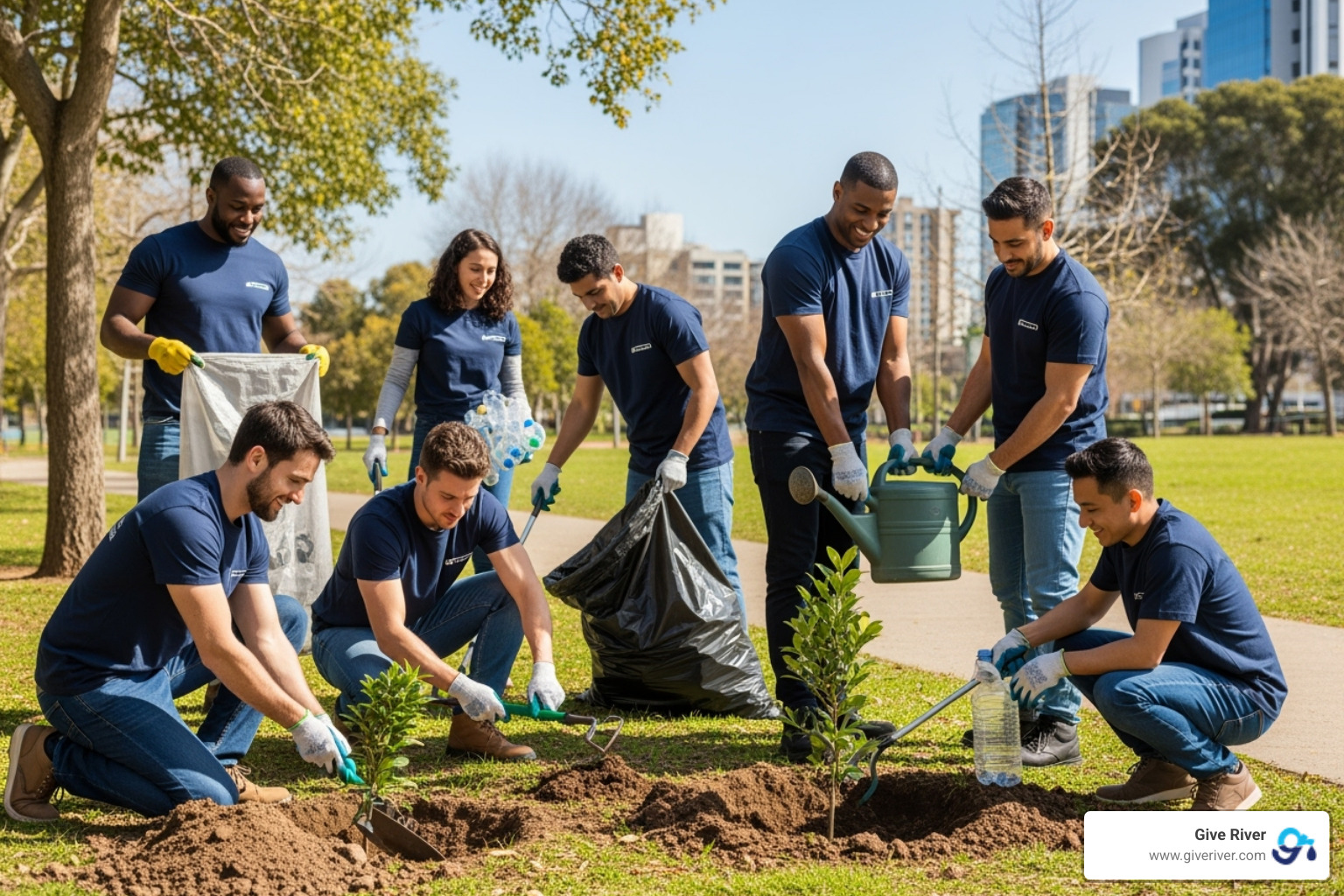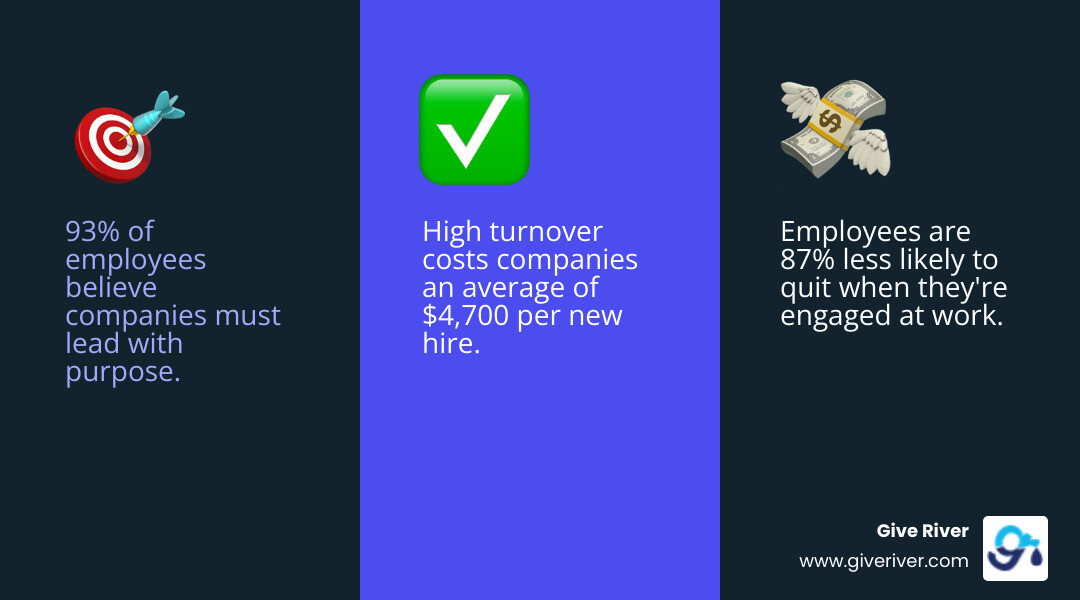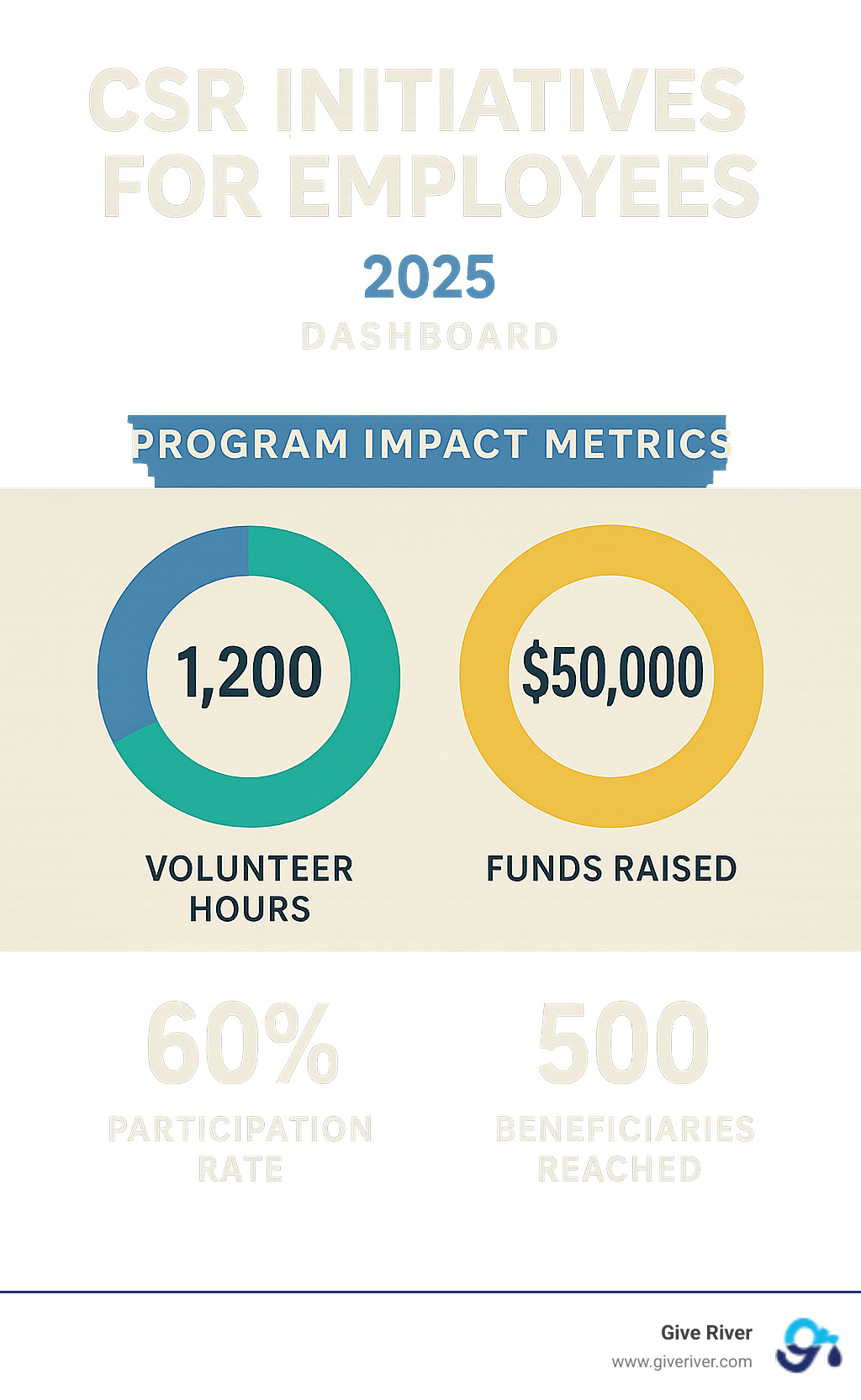Happy Team, Healthy Planet: Employee-Focused CSR Initiatives
Discover how to build effective csr initiatives for employees that boost engagement, retention, and purpose. Learn to align, design, & measure impact.

Why Employee-Focused CSR Matters More Than Ever
CSR initiatives for employees are changing how companies build engagement, retention, and purpose-driven cultures. These programs go beyond traditional corporate giving to actively involve your workforce in meaningful social impact.
Key Employee CSR Initiatives:
- Volunteer Time Off (VTO) - Paid time for community service (up to 7 days annually)
- Matching Gift Programs - Company matches employee donations 1:1 or higher
- Skills-Based Volunteering - Using professional expertise to help nonprofits
- Team Volunteer Projects - Group activities that build relationships while serving communities
- Employee-Chosen Causes - Workers select which organizations to support
- Sustainability Programs - Environmental initiatives employees can participate in
The numbers tell a compelling story. 93% of employees believe companies must lead with purpose, while 77% of consumers want to buy from companies making the world better. More importantly for your bottom line, employees are 87% less likely to quit when they're engaged at work, and high turnover costs companies an average of $4,700 per new hire.
Yet many organizations struggle with authentic implementation. While recognition platforms like Bonusly and Kudos are popular for boosting morale, they often operate separately from a company's social impact goals. The most effective employee CSR programs create deeper fulfillment by integrating purpose and connecting individual contributions to collective impact.
As Meghan Calhoun, I've spent over two decades helping organizations create healthier, more fulfilling workplaces, and I've seen how well-designed CSR initiatives for employees can transform both culture and performance. Through my work co-founding Give River, I've learned that the most successful programs combine employee choice, measurable impact, and seamless integration into daily work life.

Key terms for csr initiatives for employees:
How to Build and Launch Effective CSR Initiatives for Employees
Building meaningful CSR initiatives for employees doesn't have to feel overwhelming. When you break it down into clear, actionable steps, it becomes an exciting opportunity to transform your workplace culture while making a real difference in your community. Let's walk through the three essential steps that will help you create programs your employees will genuinely care about.
Step 1: Identify Your Core Mission and Key CSR Pillars

The foundation of any successful CSR program starts with knowing who you are as a company. This isn't about jumping on the latest social cause trending on LinkedIn—it's about finding the authentic connection between your company's values and the world's needs.
Your employees are incredibly good at spotting fake corporate gestures. They can tell when leadership is just checking boxes versus genuinely caring about making an impact. That's why aligning your CSR goals with your company's core mission is so crucial. When there's authentic alignment, your team feels proud to be part of something bigger.
Start by asking yourself some honest questions: What does our company truly stand for beyond making money? What issues keep your leadership team up at night? What causes do your employees already support in their personal lives? These conversations often reveal natural areas where your business can make a meaningful difference.
Once you understand your company's authentic purpose, you can identify your key CSR pillars. Think of these as the main areas where you'll focus your efforts. Environmental responsibility might involve sustainability programs where employees can participate in recycling initiatives or carbon reduction efforts. Cisco has seen great success with hands-on programs like organic farming projects that turn employees into environmental champions.
Ethical labor practices and human rights responsibility ensure fair treatment throughout your supply chain. Slack's apprenticeship program for formerly incarcerated individuals shows how companies can create second chances while building their workforce. Philanthropic responsibility covers traditional giving—donations, grants, and volunteer time. Walmart's partnership with Feeding America demonstrates how corporate resources can address real community needs.
Don't overlook employee treatment and well-being as a CSR pillar. Programs like Starbucks' College Achievement Plan, which helps partners pay for education, show employees that the company invests in their future. This type of internal CSR often has the most direct impact on engagement and retention.
A helpful framework for choosing your focus areas is to Review the United Nations' 17 Sustainable Development Goals. These global goals provide a roadmap for addressing everything from poverty to climate action, helping you ensure your efforts contribute to larger positive change.
For deeper insights into how other companies have successfully implemented various approaches, explore our resources on Examples of Corporate Social Responsibility and What are the Five Driving Forces of Corporate Social Responsibility.
Step 2: Design Programs That Engage and Empower Your Team
Here's where the magic happens—turning your CSR vision into programs that genuinely excite your employees. The most successful CSR initiatives for employees don't just ask people to participate; they make participation feel meaningful, accessible, and rewarding.
The key is starting with your employees' voices. Instead of leadership deciding what causes matter, conduct surveys or focus groups to understand what your team actually cares about. When employees help choose the causes, they're naturally more invested in the outcomes. This isn't just good practice—it's smart business. Engaged employees are 87% less likely to quit, and nearly 60% of employees who feel proud of their company's social responsibility stay longer.
Volunteer Time Off (VTO) has become one of the most powerful tools for employee engagement. Companies like Salesforce offer up to seven paid days annually for volunteering, sending a clear message that community service matters as much as billable hours. Goldman Sachs' Community TeamWorks encourages entire teams to take paid volunteer days together, building relationships while serving others.
Matching gift programs multiply the impact of employee donations, with 84% of donors saying they're more likely to give when a company match is available. Adobe's generous 1:1 matching up to $10,000 annually shows employees their personal giving matters to the company. Volunteer grants take this further—Adobe also provides $25 per hour for volunteer time, turning personal service into organizational support for nonprofits.
Skills-based volunteering offers something special: the chance for employees to use their professional expertise to help organizations that desperately need it. A marketing professional helping a local nonprofit with their social media strategy gains new perspectives while providing invaluable support. It's professional development with purpose.
Team volunteer projects create some of the most memorable experiences. Whether it's building Little Libraries, assembling water filters, or supporting animal shelters, these group activities strengthen workplace relationships while making a collective impact. Danske Bank found that 85% of their employees felt increased team spirit through corporate volunteering.
The most effective programs offer variety. Not everyone wants to run charity marathons, but many might enjoy park cleanups, mentoring students, or helping at food banks. Workplace giving programs make it easy for employees to donate directly from their paychecks to causes they choose.
This is where a dedicated CSR platform shows its value. While recognition tools like Bonusly or Kudos are excellent for peer-to-peer praise, Give River is built to connect that positive energy to community impact. It uniquely integrates volunteering, workplace giving, and gamification to create deeper fulfillment, turning engagement into a force for social good.
The secret ingredient is making CSR visible and celebrated in your company culture. When leadership actively participates and shares stories about impact, it signals that this work truly matters to the organization's identity.
Step 3: Measure Impact and Ensure Authenticity
Creating great programs is only half the battle—measuring their impact and maintaining authenticity is what separates successful CSR initiatives for employees from corporate theater. Your stakeholders are watching, and they're smart. Only half of consumers believe companies making social responsibility commitments, which means transparency isn't optional—it's essential.
Avoiding greenwashing starts with setting clear, measurable goals from day one. What does success actually look like for your programs? Participation rates tell you if employees are engaging—track not just how many people sign up, but how many actively participate over time. Volunteer hours provide concrete evidence of impact. Danske Bank reported over 46,000 volunteer hours in 2024, valued at more than DKK 9.5 million, giving them specific numbers to share with stakeholders.
Employee feedback might be your most valuable metric. Regular surveys can reveal whether your programs are creating the sense of purpose and pride you're aiming for. Are employees feeling more connected to your company's mission? Do they see their work as more meaningful? These qualitative measures often predict retention better than traditional metrics.

Transparent reporting builds trust with everyone—employees, customers, investors, and the communities you serve. Share both successes and challenges in your community impact assessment. When Cisco highlights how volunteers return to work with fresh perspectives and renewed commitment to sustainability, they're showing real change, not just numbers.
Engagement metrics should connect your CSR efforts to business outcomes. Are employees involved in CSR programs showing higher retention rates? Better performance reviews? Stronger team collaboration? These connections help justify continued investment while proving that doing good is also good business.
The most authentic programs continuously evolve based on feedback and results. Regular check-ins with participating employees help you understand what's working and what needs adjustment. This ongoing dialogue reinforces that their involvement genuinely matters to your organization's success.
For comprehensive guidance on effectively communicating your efforts, explore our resource on What is Corporate Social Responsibility Reporting and learn more about creating lasting change through Community Impact Initiatives.
Measuring impact isn't about proving you're perfect—it's about showing you're committed to continuous improvement and genuine positive change. When employees see their efforts creating real results, that's when CSR transforms from a company program into a source of personal and professional fulfillment.
Conclusion: Fostering a Purpose-Driven Culture
The journey we've taken together through CSR initiatives for employees reveals something powerful: when companies genuinely invest in purpose-driven programs, they create workplaces where both people and profits thrive. It's not just about checking boxes or following trends—it's about building organizations that people are proud to be part of.
Think about it this way: when you align your CSR efforts with your company's true values, design programs that actually engage your team, and measure your impact with honesty and transparency, something magical happens. Your employees don't just show up to work—they show up with purpose.
The change runs deep. Employees experience increased job satisfaction and strengthened dedication because their work connects to something bigger. They feel improved motivation and better well-being knowing their company cares about more than quarterly earnings. Most importantly, they develop genuine pride in their workplace and build stronger relationships with their teammates through shared purpose.
For your organization, the benefits are equally compelling. You'll see a stronger brand reputation as authenticity shines through your actions. Customer trust increases when people witness your genuine commitment to making a difference. Talent acquisition becomes easier because top candidates want to work for companies with clear values, while employee turnover drops significantly as people find meaning in their roles.
This is where Give River's approach creates a clear distinction. While services like Bonusly and Kudos excel at peer-to-peer recognition, they address one aspect of the employee experience. Our unique 5G Method offers a more holistic solution, weaving together recognition, guidance, wellness, growth, gamification, and community impact to create something deeper. We believe that true employee fulfillment comes when individual purpose connects with collective good—when your team's daily work contributes to a healthier planet and happier communities.
The evidence is clear: we're living in a world where people crave meaning in their work. Companies that lead with their hearts, empower their employees to make a real difference, and create cultures of generosity don't just survive—they flourish. They become the organizations that attract the best talent, inspire fierce loyalty, and build lasting success.
Your workplace culture has the potential to be a force for tremendous good. When you invest in authentic CSR initiatives for employees, you're not just improving your bottom line—you're contributing to a Purpose Driven Workplace that makes the world a little brighter. The Advantages of Corporate Social Responsibility extend far beyond what any spreadsheet can capture.
Ready to transform your workplace into a hub of purpose and impact? Learn how to build a culture of generosity and impact with our charitable solutions and find how meaningful change starts with a single step forward.



